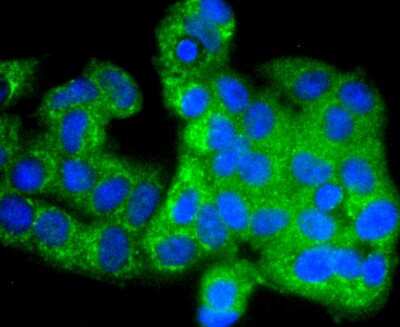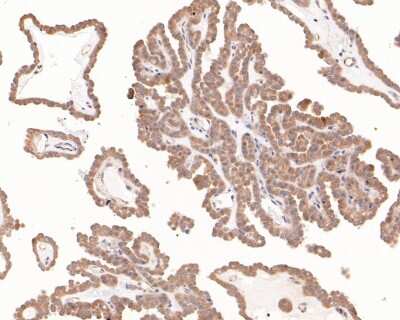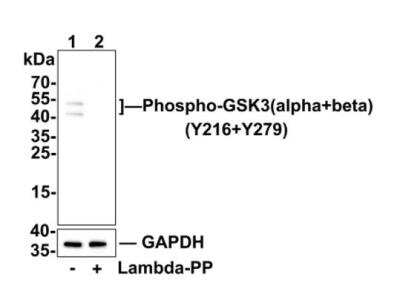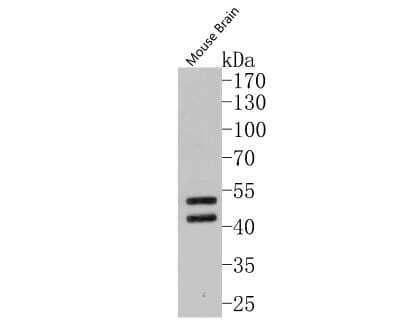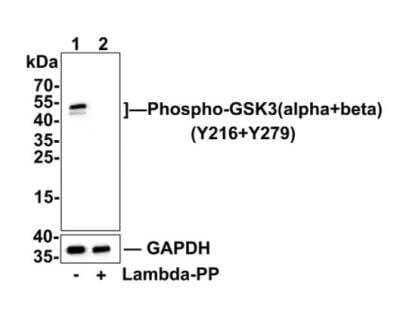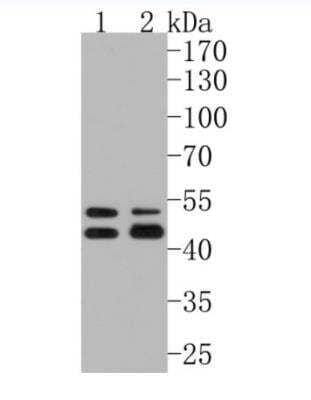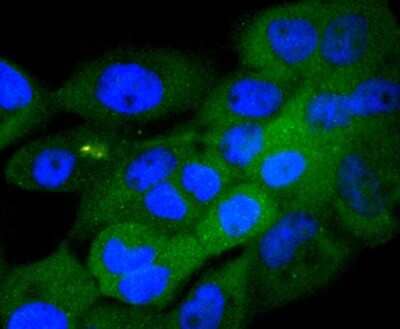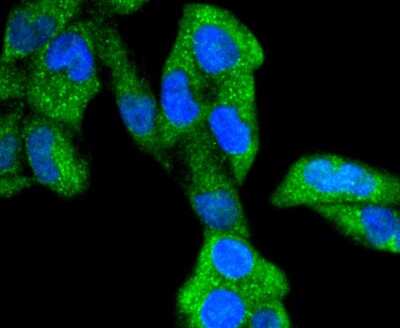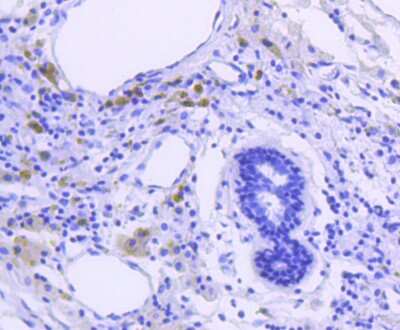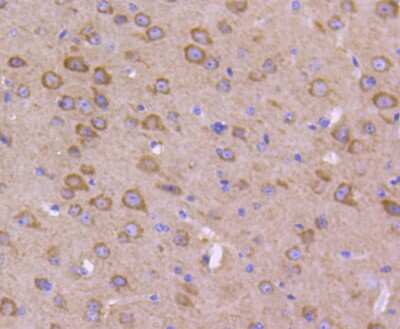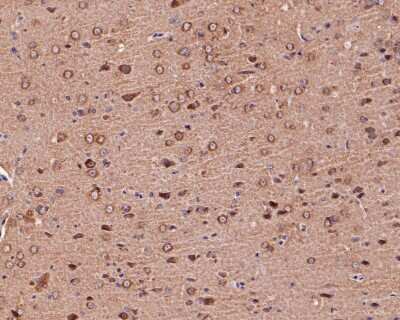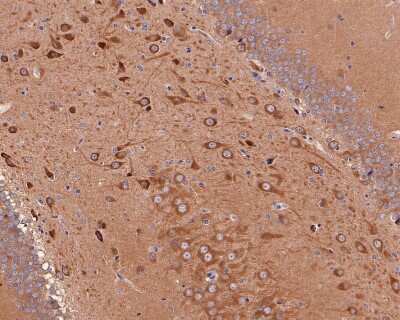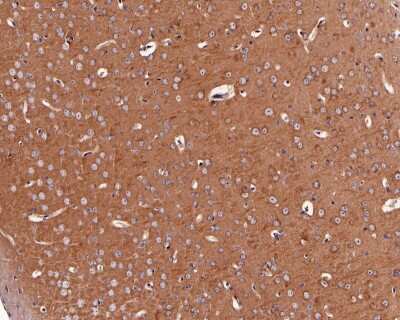GSK-3 alpha/beta [p Tyr216, p Tyr279] Antibody (SY26-05)
Novus Biologicals, part of Bio-Techne | Catalog # NBP2-67441
Recombinant Monoclonal Antibody.

Key Product Details
Validated by
Biological Validation
Species Reactivity
Validated:
Human, Mouse, Rat
Cited:
Human
Applications
Validated:
Immunocytochemistry/ Immunofluorescence, Immunohistochemistry, Immunohistochemistry-Paraffin, Immunoprecipitation, Western Blot
Cited:
Immunocytochemistry/ Immunofluorescence
Label
Unconjugated
Antibody Source
Recombinant Monoclonal Rabbit IgG Clone # SY26-05
Concentration
1 mg/ml
Product Specifications
Immunogen
Synthetic phospho-peptide corresponding to residues surrounding Tyr216 and 279 of human GSK-3 alpha/beta (SwissProt: P49840 Human; SwissProt: P49841 Human; SwissProt: Q2NL51 Mouse; SwissProt: Q9WV60 Mouse; SwissProt: P18265 Rat; SwissProt: P18266 Rat)
Modification
p Tyr216, p Tyr279
Localization
Cytoplasm, Nucleus, Cell membrane.
Clonality
Monoclonal
Host
Rabbit
Isotype
IgG
Scientific Data Images for GSK-3 alpha/beta [p Tyr216, p Tyr279] Antibody (SY26-05)
Western Blot: GSK-3 alpha/beta [p Tyr216, p Tyr279] Antibody (SY26-05) [NBP2-67441] - Analysis of GSK-3 alpha/beta [p Tyr216, p Tyr279] on mouse brain tissue lysates with Rabbit anti-GSK-3 alpha/beta [p Tyr216, p Tyr279] antibody at 1:500 dilution. Lysates/proteins at 20 ug/Lane. Predicted band size: 46/51 kDa Observed band size: 46/51 kDa Exposure time: 2 minutes; 10% SDS-PAGE gel. Proteins were transferred to a PVDF membrane and blocked with 5% NFDM/TBST for 1 hour at room temperature. The primary antibody at 1:500 dilution was used in 5% NFDM/TBST at room temperature for 2 hours. Goat Anti-Rabbit IgG - HRP Secondary Antibody at 1:300,000 dilution was used for 1 hour at room temperature.
Immunocytochemistry/Immunofluorescence: GSK-3 alpha/beta [p Tyr216, p Tyr279] Antibody (SY26-05) [NBP2-67441] - Staining Phospho-GSK3(alpha+beta)(Y216+Y279) in MCF-7 cells (green). The nuclear counter stain is DAPI (blue). Cells were fixed in paraformaldehyde, permeabilised with 0.25% Triton X100/PBS.
Immunohistochemistry-Paraffin: GSK-3 alpha/beta [p Tyr216, p Tyr279] Antibody (SY26-05) [NBP2-67441] - Analysis of paraffin-embedded human thyroid carcinoma tissue with Rabbit anti-Phospho-GSK3 alpha/beta [p Tyr216, p Tyr279) antibody washed with ddH2O and PBS, and then probed with the primary antibody at 1/800 dilution for 1 hour at room temperature. The detection was performed using an HRP conjugated compact polymer system. DAB was used as the chromogen. Tissues were counterstained with hematoxylin and mounted with DPX.
Applications for GSK-3 alpha/beta [p Tyr216, p Tyr279] Antibody (SY26-05)
Application
Recommended Usage
Immunocytochemistry/ Immunofluorescence
1:100-1:500
Immunohistochemistry-Paraffin
1:200-1:800
Western Blot
1:500-1:1000
Formulation, Preparation, and Storage
Purification
Protein A purified
Formulation
TBS (pH7.4), 0.05% BSA, 40% Glycerol
Preservative
0.05% Sodium Azide
Concentration
1 mg/ml
Shipping
The product is shipped with polar packs. Upon receipt, store it immediately at the temperature recommended below.
Stability & Storage
Store at 4C short term. Aliquot and store at -20C long term. Avoid freeze-thaw cycles.
Background: GSK-3 alpha/beta
Long Name
Glycogen Synthase Kinase 3
Alternate Names
DKFZp686D0638, EC 2.7.11, EC 2.7.11.26, glycogen synthase kinase 3 alpha, glycogen synthase kinase-3 alpha, GSK-3 alpha
Gene Symbol
GSK3A
Additional GSK-3 alpha/beta Products
Product Documents for GSK-3 alpha/beta [p Tyr216, p Tyr279] Antibody (SY26-05)
Product Specific Notices for GSK-3 alpha/beta [p Tyr216, p Tyr279] Antibody (SY26-05)
This product is for research use only and is not approved for use in humans or in clinical diagnosis. Primary Antibodies are guaranteed for 1 year from date of receipt.
